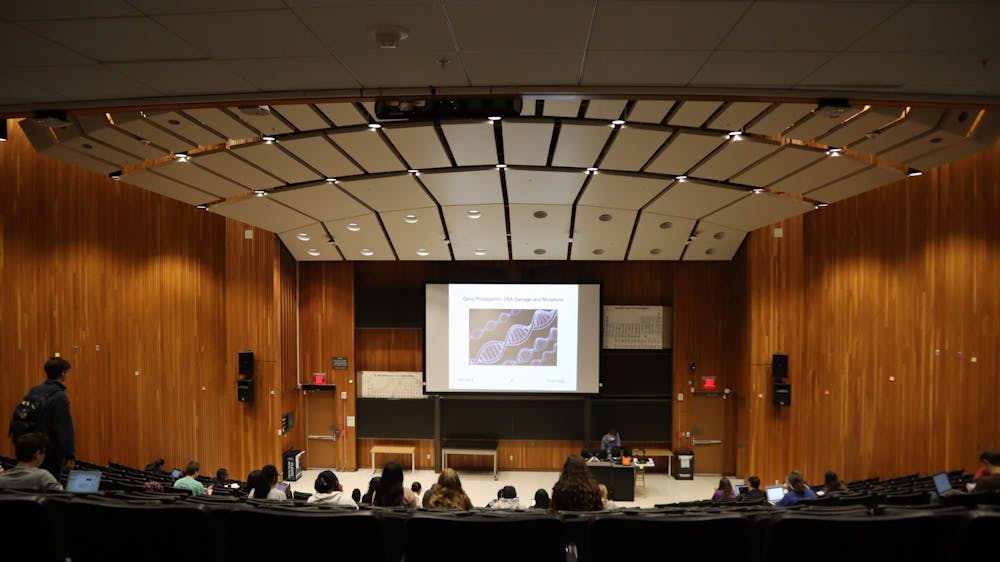During this past midterm season, University students navigated examinations in formats determined by a combination of factors, including departmental policies, instructor preferences, course type and class size. Exam formats warrant scrutiny because they are vital to the efficacy of student efforts. When exam formats are most appropriate for their respective courses, students are challenged while also set up for the fairest chance at success. However, inappropriate exam formats have the power to unjustly disadvantage students. A striking example of an unsuitable format are those exams that are in-person, online and taken in large lecture halls — this exam type should see improvements or be completely scrapped in favor of various better options.
For me, the most poignant takeaway from PSYC 1010 was how easy it would have been to cheat on the exams. A typical introductory class, it enrolled several hundred students. All the exams were administered within the regular lecture hall via UVACollab, the central website for course assignments. Since exam rules prohibited materials such as textbooks and notes, attendance was mandated to ensure no such resources were used. However, there was no attendance monitor ensuring students took the exam from the lecture hall. Unlike small lectures and seminars where instructors can note each student’s presence individually, instructors of large lectures are not aware who is not present. Dishonest students could choose to take the exam from any location and with any resources they preferred, giving them an advantage over those who followed the rules. The least the University could do to address absentee examinee concerns is mandate that all online in-person exams be password-protected.
Online exams on websites like UVACollab also make technology-aided cheating much easier. Studies conducted on the rise of online testing in the wake of the COVID-19 pandemic indicate that students are more likely to cheat on online tests. With the laptop right in front of you, one can open an Internet tab to search answers, pull up notes on Word or read a helpful text message from a friend. When online exams take place in large lecture halls, detecting technological cheating is close to impossible. Surveillance may constitute a few teacher’s assistants roaming the lecture hall, but with hundreds of test-takers, this is not a sufficient measure. The University trusts students to follow the Honor Code, and students risk harsh penalties if they violate it. But the University is a competitive, high-pressure environment where cheating can easily become normal if undetected and unpunished. Moreover, an environment where cheating is even perceived to be easy or commonplace is troublesome because otherwise students might feel they have to break rules in order to level the playing field. Students should never be or perceive that they are at a disadvantage for respecting the Honor system.
Online exams are at the mercy of the capricious nature of the Internet and technology. One will never forget the day their UVACollab exam is canceled because the website crashes on the day that the exam was scheduled. Such disasters require messy rescheduling that harms students who had made important plans responsibly or spent time studying for the exam instead of doing other assignments. Online tests also generate anxiety about technological problems that are to some degree — or entirely — out of the control of students and instructors. What if your laptop refuses to connect to the Internet, or the Internet is spotty? What if your laptop is unexpectedly low on battery? What if your laptop crashes in the middle of the exam? Any of these issues could severely impact your exam grade, which impacts your course grade, which impacts your GPA. There are several ways to cushion the disadvantages of online exams — they could either be asynchronous take-home online exams, allowing time flexibility for dealing with tech problems, or they could be in-person paper exams.
There are several more functional exam formats that could replace in-person online exams in large lecture courses. Paper exams, for example, require physical presence in a designated lecture hall, deter technological cheating and eliminate the possibility of technological mishaps. Other possible exam formats are open-note or open-note at-home exams. Open-note exams allow students to use notes that they meticulously created for themselves. In-class open-note exams may be somewhat flawed in that students may share notes. Still, this is more easily detectable and visible than clicking around a laptop, and can be deterred by proctoring open-note paper exams in small or medium-sized classrooms. Additionally, at-home exams — which are inherently open-note — are beneficial in that they automatically level the playing field, as all students have equal opportunity to utilize helpful resources. Additionally, at-home exams are more accessible to mobility-impaired students and do not obligate sick students to come in close proximity to others. These types of exams are not necessarily facile since students have access to answers on the internet. However, instructors typically do — and if this type of exam was required, instructors would essentially be forced — fill them with original, tailored questions that require application of concepts, which cannot simply be copy and pasted into Google Search.
The legitimacy and fairness of college classes would benefit from academic departments transitioning away from in-person online exams in lecture halls to the aforementioned exam formats. At the very least, the University should make tweaks to in-person online exams that deter cheating, such as password-protection or more personnel for surveillance. Students should be rest assured that exams are as fair as possible.
Lauren Dunbar is a Viewpoint Writer for The Cavalier Daily. They can be reached at opinion@cavalierdaily.com.
The opinions expressed in this column are not necessarily those of The Cavalier Daily. Columns represent the views of the authors alone.







